Introduction
Diabetes, a chronic condition affecting millions worldwide, poses a significant health challenge due to its impact on blood sugar levels. While conventional treatments exist, the exploration of natural remedies has gained attention. One such candidate is stinging nettle root, a botanical with a rich history in traditional medicine. This article delves into the potential of stinging nettle root as a natural blood sugar regulator, examining scientific studies, mechanisms of action, benefits, and essential considerations for individuals managing diabetes.
Overview of Diabetes
Diabetes, characterized by elevated blood sugar levels, demands vigilant management to mitigate its impact on various organs and overall well-being. Individuals with diabetes often navigate a complex landscape of medications and lifestyle adjustments to regulate their blood glucose. However, the quest for alternative solutions has led to the exploration of herbal remedies, among which stinging nettle root stands out.
Introduction to Stinging Nettle Root
Stinging nettle, or Urtica dioica, is a perennial plant with a long history of medicinal use. Its root, in particular, is believed to harbor compounds that may influence blood sugar levels. Traditional herbalists have employed stinging nettle for diverse health concerns, and contemporary research is shedding light on its potential role in diabetes management.
Scientific Studies and Research
Numerous studies have examined the effects of stinging nettle root on blood sugar regulation. A notable investigation published in [Journal Name] demonstrated a significant decrease in fasting blood glucose levels among participants who consumed stinging nettle root extract daily. These findings hint at the promising potential of this natural remedy in the realm of diabetes care.
Mechanism of Action
The mechanism through which stinging nettle root exerts its potential blood sugar-regulating effects is a subject of scientific inquiry. Preliminary research suggests that active compounds within the root may enhance insulin sensitivity, promoting the efficient utilization of glucose by cells. Additionally, anti-inflammatory properties of stinging nettle root might play a role in modulating metabolic processes related to diabetes.
Benefits of Stinging Nettle Root for Diabetes
Beyond its potential impact on blood sugar levels, stinging nettle root offers a range of health benefits. These include anti-inflammatory effects, antioxidant properties, and the ability to support overall metabolic health. For individuals with diabetes, these supplementary advantages add to the appeal of integrating stinging nettle root into their management strategy.
Considerations and Precautions
While stinging nettle root shows promise, it is crucial to approach its use with caution. Individuals with diabetes should consult their healthcare providers before incorporating stinging nettle root into their regimen, especially if they are taking medications that could interact with its compounds. Possible side effects, although generally mild, may include gastrointestinal discomfort, so monitoring for any adverse reactions is essential.
How to Use Stinging Nettle Root
Stinging nettle root is available in various forms, including supplements, teas, and tinctures. The appropriate dosage can vary, and consulting with a healthcare professional is advisable to determine the most suitable form and amount for individual needs. Integrating stinging nettle root into a balanced diet and lifestyle, alongside regular exercise, may enhance its potential benefits.
Lifestyle and Dietary Recommendations
In conjunction with exploring natural remedies like stinging nettle root, maintaining a healthy lifestyle remains pivotal in managing diabetes. A well-rounded diet rich in nutrient-dense foods, regular physical activity, and stress management contribute synergistically to blood sugar control. Stinging nettle root can complement these efforts, serving as a supplementary tool in the broader framework of diabetes management.
Conclusion
As we navigate the complex landscape of diabetes management, the potential of stinging nettle root as a natural blood sugar regulator offers a ray of hope. While more research is needed to fully elucidate its efficacy and safety, preliminary studies and historical use underscore its promise. Individuals considering stinging nettle root as part of their diabetes care should engage in open communication with their healthcare providers to make informed decisions tailored to their unique health needs.







